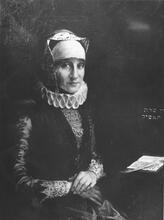Bella Perlhefter
Bella Perlhefter was an accomplished and professional Hebrew letter writer, instructor of music and rhythm, and entrepreneurial seventeenth-century businesswoman. Born to a wealthy family, Bella received an excellent Hebrew education. Her ornate Hebrew learning exhibits a high level of Jewish learning and allowed her to serve as composer and writer of Hebrew letters for other Jewish women. All seven of Bella’s children died prematurely. Bella urged her husband to compose a Yiddish work of moralistic literature to memorialize their children, and she composed a moving introduction.
Family
Bella (Baila, Bila) Perlhefter (d. 14 Elul, ע"ת = Sept. 9, 1710) was an accomplished and professional Hebrew letter writer, instructor of music and rhythm, and entrepreneurial seventeenth-century businesswoman. Deeply attached to the Jewish community in Prague, she endured years of isolation as the result of her husband’s peripatetic lifestyle. The central source of anguish in her life was the premature death of her seven children, none of whom survived to adulthood. She commemorated them in an innovative way that ultimately serves as an eloquent memorial to her own life. The sources for Bella’s life allow only glimpses into it: a few letters remaining from her correspondence, her introduction to the Yiddish manuscript work memorializing her children, and some inferences that can be drawn from the writing of her husband, Ber (Shmuel Yissachar Dov Ber, son of Judah Leib Eibeschuetz) Perlhefter (d. after 1713).
Letter Writer and Businesswoman
A well-to-do family of good standing and prominent ancestry in seventeenth-century Vienna, the Perlhefters migrated to Prague after the expulsion of Viennese Jews in 1670. Bella (born c. 1650), daughter of the Jewish notable Jacob Perlhefter (d. 1669), received an excellent education. Her husband Ber Eibescheutz took her family name after their marriage. Bella, whose ornate Hebrew writing exhibits a high level of Jewish learning, served as composer and writer of Hebrew letters for other Jewish women. In her letters to Ber, she relegates their personal relationship to the margins, concentrating instead on the transmission of crucial information concerning his business. News from Prague, where at least two of her brothers still lived, dominated her letters. In 1666, she discussed in her letter the death of apostate Wenzel Winbersky (Simha Winiberg) and the ensuing charge that Jewish communal leaders conspired in his murder, internecine quarrels between lay leaders of the Prague community, and the welfare of various individuals.
In the late 1670s and early 1680s, Ber became deeply involved in the Sabbatean movement as a maggid in the circle of Abraham ben Michael Rovigo (c. 1650–1713) in Modena. He was instrumental in shaping the moderate wing of the movement after the death of Sabbetai Zevi. Though he initially pinned hopes on Mordecai of Eisenstadt (1650–1729) as a second redeeming figure, he later became disappointed and renounced his support. His interest in the movement may have attracted the attention of the noted Christian Hebraist Johann Christoph Wagenseil (1633–1705), Professor of History, Law and Oriental Languages (including Hebrew) at the Lutheran University at Altdorf. Wagenseil employed Jews and converts as translators and informants in his Hebraist enterprise.
Bella’s surviving letters are preserved in Wagenseil’s collection, now at the Leipzig University Library. From these letters we learn that Bella lived in the small south-German Jewish community of Schnaittach while her husband travelled as a Sabbatean preacher or worked in Wagenseil’s atelier in Altdorf. Bella corresponded with Wagenseil directly, rebuffing his entreaties that she come to Altdorf, which had no Jewish community. She tried to interest Wagenseil in purchasing various commodities, such as wheat and meat for his household. Eager to meet Bella, Wagenseil visited her home and brought a gift for one of their children—a visit which Ber recalled as having some awkward moments.
Memorializing her Children
To memorialize her children, Bella urged Ber to compose in Yiddish a work of moralistic literature. He is the primary author of the encyclopedic work to which she penned the introduction. A long poem in this introduction bears an acrostic of her name in Hebrew, Bella bat ha-kazin rabbi Ya’akov Perl Hefter. Be’er Sheva (Seven Wells) contains a chapter named for each of their deceased children: Moshe, Ya’akov, Wolf, Leib, Sarah, Rachel, and Yutta. Though not published until recently, it nevertheless had a wide and enduring appeal, as the many manuscript copies dating through the nineteenth century attest. The manuscripts were commissioned to “serve as a consolation for childless people or for those who had endured the loss of a child.” Ber’s characterization of the work illuminates the gender divide. “I wrote the book Be’er Sheva for people of meager intellectual strength such as women, and I put it into their language, Ashkenaz (Yiddish). It includes wonderful matters from [the Bible]…, midrashim, pleasant tales, charms, and other magical actions to take. The great importance of this book for people of lesser value cannot be imagined.” (Introduction to Be’er Hetev [Prague, 1699]). By 1699, the Perlhefters had returned to Prague, where Ber served as a dayyan (rabbinic judge).
Nathanael Riemer and Sigrid Senkbeil, ´Beer Sheva` by Beer and Bella Perlhefter. Edition of a Seventeenth Century Yiddish Encyclopedia. Wiesbaden: Harrassowitz Publishing House: 2011.
This edition contains a comprehensive bibliography of the manuscript copies of Be’er Sheva and of the manuscript and printed works related to Bella and Ber Perlhefter, xxxv-xlii.
The correspondence of Wagenseil that includes Bella and Ber Perlhefter’s letters (which can now be viewed on the National Library of Israel digitized manuscripts website):
Universitätsbibliothek Leipzig, ms. BH 18, section beginning folio 43r: Johann Wagenseil, Hebraicarum, Rabbinicarum atque Iudeo-Germanicarum Epistolarum MScriptarum farrago, quibus immixte sunt subinde disertationes ac recensiones dogmatum, opinionum, rituum, aliarum que rerum, item casuumque variorum qui Judaeis passim acciderunt.
Weinryb, Bernard. "Historisches und Kulturhistorisches aus Wagenseils hebräischen Briefwechsel." Monatsscrift für Geschichte und Wissenschaft des Judenthums, N.S. 47 (1939): 325-41, published letters of Bella and Ber Perlhefter from the Leipzig ms.




